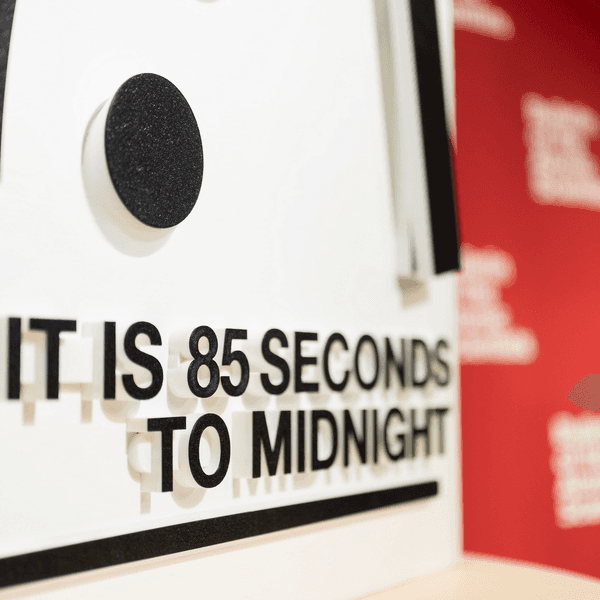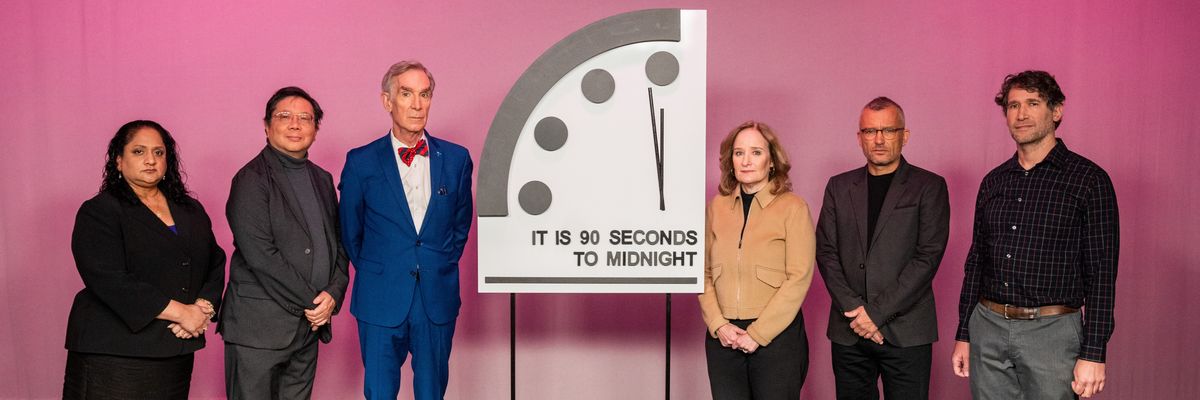I inhale the big, do-nothing shrug that always follows the annual posting, by The Bulletin of the Atomic Scientists, of its global metaphor for Armageddon.
For the second year in a row, the Doomsday Clock has been set—by scientists analyzing the dangers faced by Planet Earth due to human exploitation and nuclear-armed geopolitics—at 90 seconds to midnight. In other words, be afraid. Be very afraid.
The dangers include ongoing nuclear-weapons development by both major and minor national powers, combined with the planet’s current slaughter-wars—in Ukraine, Palestine, and elsewhere—and the ever-looming possibility that they could go nuclear. In other words, human civilization’s collective thinking remains trapped in an us-vs-them modality. One of the weirdest aspects of this that the Bulletin cited was the fact that artificial intelligence has begun assuming control of our fate:
Military uses of AI are accelerating. Extensive use of AI is already occurring in intelligence, surveillance, reconnaissance, simulation, and training. Of particular concern are lethal autonomous weapons, which identify and destroy targets without human intervention. Decisions to put AI in control of important physical systems—in particular, nuclear weapons—could indeed pose a direct existential threat to humanity.
Join me as I let loose a child’s scream of terror and disbelief.
And of course this is all combined with the planet’s ongoing climate collapse. As the Bulletin pointed out, 2023 was the hottest year ever recorded, greenhouse gas emissions are still on the rise, the ice is still melting in Antarctica and... uh, we’re not addressing this with any effectiveness. You know, we’re still too busy playing war and exploiting what’s left of the planet’s resources.
This is how human civilization has organized itself—and nothing can change it, right? That seems to be the attitude of much of the media, which largely contextualizes the news it brings us in a mainstream shrug. Climate collapse? Nuclear war and global annihilation? That’s way too complicated to write about. Come on, we’ve got an election coming up. Us vs. them!
This, at any rate, is what occurred to me when I read a story in The Washington Post the other day, which kept trying to make the point that the country is collapsing into what it called “tribalism,” that is, left-vs.-rightism, with both sides equally convinced of their rectitude and equally snarky toward the other guys. Both sides—get it? When the corporate media serves us politics this way, it displays its (centrist) “objectivity,” which, as far as it’s concerned, is simply reality and not something to be critically analyzed.
War isn’t the result of evolution but sheerly the unevolved aspect of who we are.
The problem, according to centrist analysis, is that the country is getting more and more polarized, both politically and culturally. On one side you’ve got Trump and the MAGA Republicans. On the other side, you’ve got Bernie Sanders supporters. Pretty scary! The USA has never been this divided, the story notes, apparently failing to remember slavery, Jim Crow lynchings, race-separated bathrooms, and such.
What was most unsettling to me about the story, however, was its pulling in several social scientists who explained the nature of evolution to us. While, yes, human beings learned to work together over the millennia and created self-sustaining communities, aka, tribes, the “evolution of cooperation required out-group hatred,” according to a Yale sociologist. In other words, there could be no “us” without a “them” lurking just around the bend—not simply different from us but scary, threatening, and no doubt evil.
While the Post story had no connection whatsoever to The Bulletin of the Atomic Scientists and its 90-seconds-to-midnight global prognosis, I felt a shrug of indifference toward it nonetheless, in that it remained quietly caged in the us-vs.-them mindset that makes human collective thinking and, oh my God, geopolitical cooperation a cynical joke. That ain’t gonna happen. War is inevitable. So is our trillion-dollar military budget. Any questions?
My primary question is this: How dare you shrug at the Doomsday Clock, at the looming inevitability of climate collapse, at the ongoing expansion of nukes, and the ultimate certainty of nuclear war... if nothing changes?
We are capable of larger thinking than this! That’s the ultimate message of the atomic scientists, and for corroboration I turn to World Beyond War, which makes the point that the very essence of evolution is the expansion of our thinking to embrace ever-larger realities of cooperation, connection, and understanding. And not only that, killing our fellow human beings is not the simplistic result of what our DNA tells us to do but a political creation of the last several millennia that is anything but universally accepted.
“According to myth, war is ‘natural,’” a World Beyond War essay points out. “Yet a great deal of conditioning is needed to prepare most people to take part in war, and a great deal of mental suffering is common among those who have taken part...
“ ...We need to understand war as the cultural creation that it is and stop imagining it as something imposed on us by forces beyond our control... In fact, war is not required by a particular lifestyle or standard of living because any lifestyle can be changed, because unsustainable practices must end by definition with or without war, and because war actually impoverishes societies that use it.”
In other words, war isn’t the result of evolution but sheerly the unevolved aspect of who we are. Humanity did “evolve with habits of cooperation and altruism,” and in so doing created communities of connection and trans-individual support. And yes, any community has an edge, beyond which looms the unknown. But as we encounter the unknown, we needn’t see it, simplistically, as “the enemy,” but rather as part of a larger community, which requires larger understanding. Our need to understand never stops.




